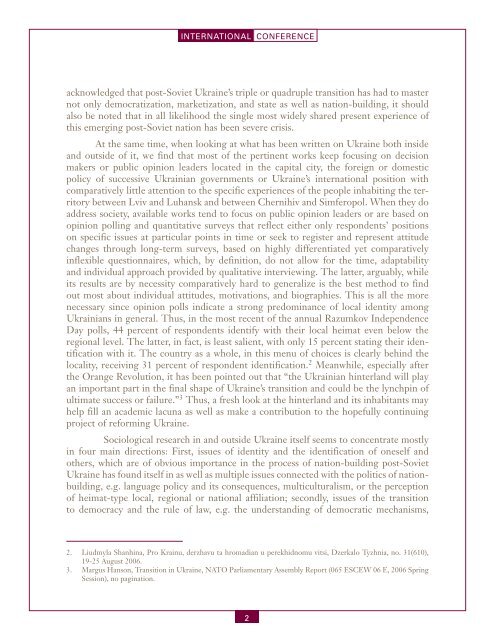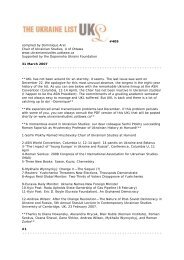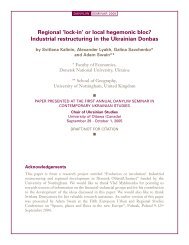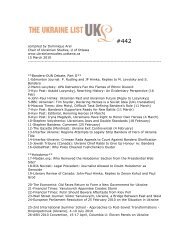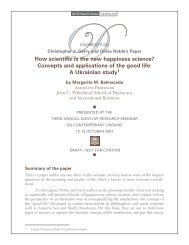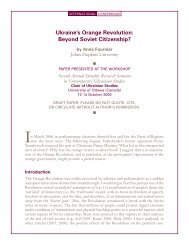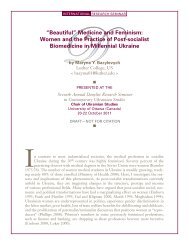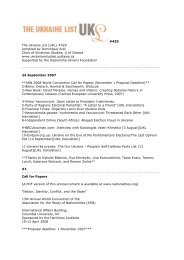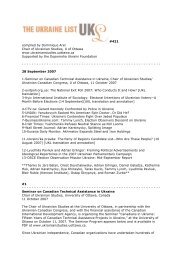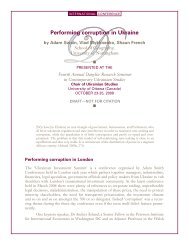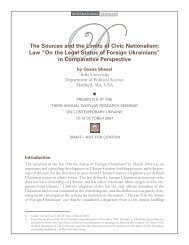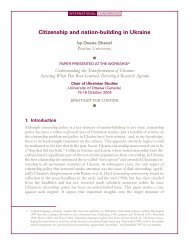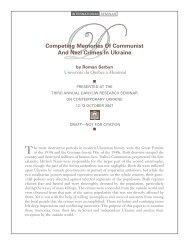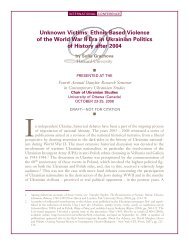Paper - Chair of Ukrainian Studies
Paper - Chair of Ukrainian Studies
Paper - Chair of Ukrainian Studies
Create successful ePaper yourself
Turn your PDF publications into a flip-book with our unique Google optimized e-Paper software.
international CONFERENCE<br />
acknowledged that post-Soviet Ukraine’s triple or quadruple transition has had to master<br />
not only democratization, marketization, and state as well as nation-building, it should<br />
also be noted that in all likelihood the single most widely shared present experience <strong>of</strong><br />
this emerging post-Soviet nation has been severe crisis.<br />
At the same time, when looking at what has been written on Ukraine both inside<br />
and outside <strong>of</strong> it, we find that most <strong>of</strong> the pertinent works keep focusing on decision<br />
makers or public opinion leaders located in the capital city, the foreign or domestic<br />
policy <strong>of</strong> successive <strong>Ukrainian</strong> governments or Ukraine’s international position with<br />
comparatively little attention to the specific experiences <strong>of</strong> the people inhabiting the territory<br />
between Lviv and Luhansk and between Chernihiv and Simferopol. When they do<br />
address society, available works tend to focus on public opinion leaders or are based on<br />
opinion polling and quantitative surveys that reflect either only respondents’ positions<br />
on specific issues at particular points in time or seek to register and represent attitude<br />
changes through long-term surveys, based on highly differentiated yet comparatively<br />
inflexible questionnaires, which, by definition, do not allow for the time, adaptability<br />
and individual approach provided by qualitative interviewing. The latter, arguably, while<br />
its results are by necessity comparatively hard to generalize is the best method to find<br />
out most about individual attitudes, motivations, and biographies. This is all the more<br />
necessary since opinion polls indicate a strong predominance <strong>of</strong> local identity among<br />
<strong>Ukrainian</strong>s in general. Thus, in the most recent <strong>of</strong> the annual Razumkov Independence<br />
Day polls, 44 percent <strong>of</strong> respondents identify with their local heimat even below the<br />
regional level. The latter, in fact, is least salient, with only 15 percent stating their identification<br />
with it. The country as a whole, in this menu <strong>of</strong> choices is clearly behind the<br />
locality, receiving 31 percent <strong>of</strong> respondent identification. 2 Meanwhile, especially after<br />
the Orange Revolution, it has been pointed out that “the <strong>Ukrainian</strong> hinterland will play<br />
an important part in the final shape <strong>of</strong> Ukraine’s transition and could be the lynchpin <strong>of</strong><br />
ultimate success or failure.” 3 Thus, a fresh look at the hinterland and its inhabitants may<br />
help fill an academic lacuna as well as make a contribution to the hopefully continuing<br />
project <strong>of</strong> reforming Ukraine.<br />
Sociological research in and outside Ukraine itself seems to concentrate mostly<br />
in four main directions: First, issues <strong>of</strong> identity and the identification <strong>of</strong> oneself and<br />
others, which are <strong>of</strong> obvious importance in the process <strong>of</strong> nation-building post-Soviet<br />
Ukraine has found itself in as well as multiple issues connected with the politics <strong>of</strong> nationbuilding,<br />
e.g. language policy and its consequences, multiculturalism, or the perception<br />
<strong>of</strong> heimat-type local, regional or national affiliation; secondly, issues <strong>of</strong> the transition<br />
to democracy and the rule <strong>of</strong> law, e.g. the understanding <strong>of</strong> democratic mechanisms,<br />
2. Liudmyla Shanhina, Pro Krainu, derzhavu ta hromadian u perekhidnomu vitsi, Dzerkalo Tyzhnia, no. 31(610),<br />
19-25 August 2006.<br />
3. Margus Hanson, Transition in Ukraine, NATO Parliamentary Assembly Report (065 ESCEW 06 E, 2006 Spring<br />
Session), no pagination.<br />
2


